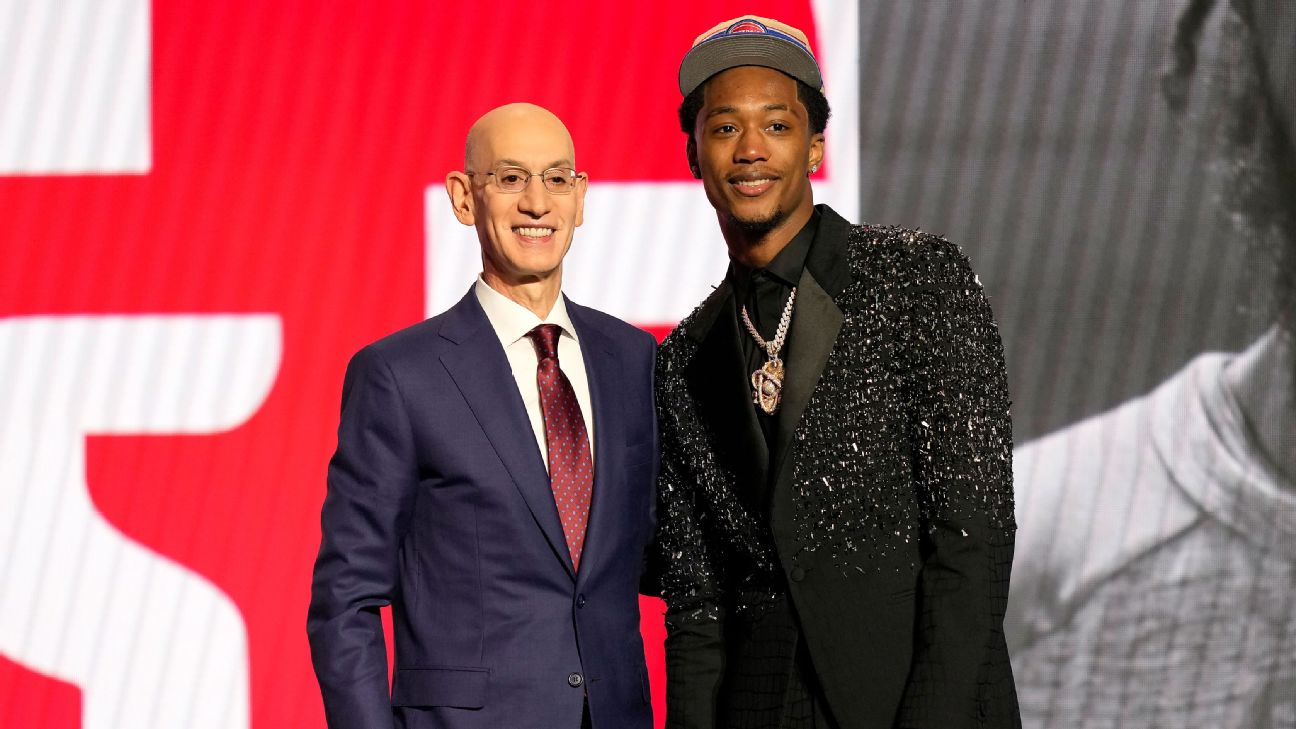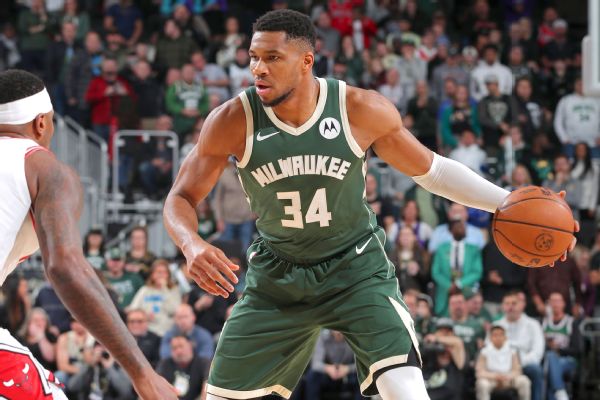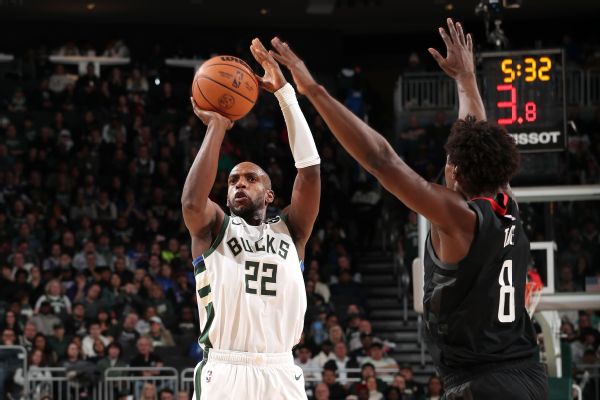Round 1 of the 2024 NBA draft began with Zaccharie Risacher, the first of four French players taken in the first round, being drafted by the Atlanta Hawks with the No. 1 pick. And it ended with the 2024 NBA champion Boston Celtics drafting Creighton’s Baylor Scheierman with pick No. 30.
Which fan bases should be happy with what their favorite team did on Day 1, such as the Minnesota Timberwolves trading up to draft Rob Dillingham? Who should be wondering about the players who fell down the draft board, such as Dalton Knecht?
It’s time to break down what happened Wednesday night in New York’s Barclays Center. ESPN’s Jonathan Givony, Jeremy Woo and Kevin Pelton share their winners, surprises and biggest questions after 30 picks went off the board in Round 1.
We’ll be back for Round 2 on Thursday at 4 p.m. ET on ESPN.
![]() NBA draft coverage:
NBA draft coverage:
Grading the biggest draft night trades
Draftcast: Analysis for Round 1 picks
More draft coverage

Givony’s biggest winners from Round 1
![]()
Minnesota Timberwolves
The pick: Rob Dillingham (No. 8 via trade)
The Timberwolves made the most aggressive move of Round 1 by trading into the No. 8 spot to draft Dillingham. With starter Mike Conley turning 37 years old, president of basketball operations Tim Connelly knew he needed to be aggressive in finding the veteran point guard’s successor. With Dillingham, Connelly has his own version of Kyrie Irving, who knocked the Timberwolves out of the playoffs in the Western Conference finals.
Dillingham is lightning in a bottle, ranking not only as one of the best scorers in this draft class already as a freshman, but also as an underrated passer who brings real creativity passing off a live dribble, a skill that he can continue to hone as his pro career moves forward. The fact he showed he can play off the ball, making 44% of his 3-pointers this season, will help him operate alongside a budding superstar in Anthony Edwards.
His biggest weakness, his defense, could be negated to an extent with NBA Defensive Player of the Year Rudy Gobert behind him.
![]()
Los Angeles Lakers
The pick: Dalton Knecht, SF (No. 17)
Knecht shockingly fell out of the lottery and into the welcoming hands of the Lakers, who gleefully picked him up. A half-dozen NBA executives told ESPN that it was Knecht’s age — he turned 23 on April 19 — and not concerns about his medicals or other reasons that primarily caused his slide. His workouts and interviews were excellent, some of those same executives confirmed, with his defense being another reason cited for his fall down the draft board.
Some surprising picks that were made in the middle of the lottery caused Knecht to slide past the group of teams he was most focused on in the pre-draft process with visits and workouts, leading to a big chunk of teams passing on selecting him, including the Miami Heat and Philadelphia 76ers. Both of those teams seem to be in win-now mode and could clearly use a shooter/scorer in his mold.
Knecht is the most prolific scorer in this draft not named Zach Edey, averaging a robust 28 points per 40 minutes despite entire defenses planning for slowing him down on a nightly basis. He’s a prolific shooter who converted 40% of his 3s, but he also does quite a bit of damage in the open court, attacking closeouts, in pick-and-roll, in the post and coming off screens, making him a complete offensive player.
New Lakers coach JJ Redick is a huge fan of this pick, a team source told ESPN, as he has been preaching the importance of adding shooting to the roster, not a surprise considering Redick made over 2,000 NBA 3s in his career at a 41% clip.
“None of us thought he’d be there. It’s crazy. The most ready guy in the draft, ready to play right away,” the team source said.
![]()
Oklahoma City Thunder
The pick: Nikola Topic, PG (No. 12)
Less than a week after trading starting point guard Josh Giddey to the Chicago Bulls, the Thunder replaced him with arguably the best point guard in the draft in Topic.
Having built an incredible array of young talent, while brimming with future draft picks, the Thunder can afford to play the long game with Topic, who will miss all of next season with a torn ACL that will require surgery in the coming weeks, under Oklahoma City’s careful supervision.
Topic ranked as one of the best pick-and-roll players in European basketball already as an 18-year-old, which is scary considering how much point guards typically continue to improve in this area with age and experience. His ability to make instantaneous reads while mapping out the court and processing the game with surgical precision is a rare and coveted commodity in today’s NBA game.
Givony’s biggest surprises of Round 1
![]()
Detroit Pistons
The pick: Ron Holland, guard (No. 5)
Detroit pulled off the first surprising move of Round 1, selecting Holland, ESPN’s No. 13 prospect, with the No. 5 pick.
The fact the Pistons selected Holland — at one point projected to be the No. 1 pick in the draft, and ESPN’s No. 2 recruit coming out of high school, was not as surprising as Holland’s fit on their current roster. Detroit made fewer 3s than any team in the NBA last season, while also ranking among the worst teams in the league in 3-point percentage.
It seems like the Pistons’ roster will need some retooling to get Holland the reps he needs to reach his potential as such a high draft pick, as they struggled to space the floor around Cade Cunningham last season, but they do have ample cap room to continue to make significant changes with a new president of basketball operations and coach in place as they likely begin another rebuilding process.
![]()
Memphis Grizzlies
The pick: Zach Edey, center (No. 9)
It was obvious since the start of the season that Edey made significant strides on both ends of the floor that would surely make him a coveted player on draft night and potential lottery pick.
Memphis picked him higher than almost anyone envisioned, as it was clear he had a significant market throughout the lottery and trading down would risk forcing the Grizzlies to pivot far down their board to select the draft’s third-best center.
Edey is a dream target for an electric playmaking guard such as Ja Morant to pair with in pick-and-roll actions. He sets wide, bruising screens at 7-foot-5, 298 pounds, and is an outstanding target rolling to the paint and catching everything thrown his way with his huge, magnetic hands and 7-foot-11 wingspan.
He’ll have to continue to improve his conditioning to keep up in transition, but he’ll be ready to make an immediate impact on both ends of the floor. He could even contend for Rookie of the Year honors with the sheer productivity he’s bound to amass next season.
![]()
Miami Heat
The pick: Ke’el Ware (No. 15)
After Miami struck gold with UCLA senior Jaime Jaquez Jr. in last year’s draft, it was surprising to see the Heat pass on Dalton Knecht after he fell right into their laps with the No. 15 pick, allowing him to eventually get picked by the Lakers at No. 17.
The intel around Ware’s lack of intensity from his recent pre-draft workouts caused several teams to speculate he might fall all the way to the end of the first round or possibly to the second round. In the end, the Heat, known for the emphasis they place on toughness, consistent energy and conditioning, drafted him.
It’s possible the Heat thought Knecht’s defense wasn’t a fit with Tyler Herro’s similar limitations on the perimeter, and that upgrading the frontcourt with a young rim-protector such as Ware was more important. It will be interesting to see how the careers of Knecht and Ware unfold from here, as many around the NBA were certainly surprised to see this shift in draft strategy that possibly signals more changes are underway.

What was the best pick of the night?
![]()
Pelton: Reed Sheppard to the Houston Rockets at No. 3.
The Rockets had a pretty good sense they would have a shot at Sheppard, but the important thing here was Houston passing on the temptation to trade this pick for a veteran. I love how Sheppard, my top-rated prospect, fits with the Rockets’ young core by adding badly needed shooting.
![]()
Woo: Donovan Clingan to the Portland Trail Blazers at No. 7.
Clingan was a player most teams regarded as a top talent in this draft and a potential long-term cornerstone rim-protector. The way the lottery ended up shaking out — with none of the teams selecting between No. 3 and No. 6 harboring a need for a center — benefited the Trail Blazers greatly, as he wound up falling into their laps.
From both a value and fit perspective, this was a huge win for Portland, a team that has been building around smaller guards for the past few seasons and will need a defensive presence behind them to make that work. We’ll see what this means for returning centers Deandre Ayton and Robert Williams III.
What was your favorite trade of Round 1?
![]()
Pelton: The Phoenix Suns picking up three second-round picks from the Denver Nuggets to slide back from No. 22 to No. 28. After center Yves Missi went off the board one pick ahead of Phoenix, the Suns might have had Ryan Dunn at the top of their board and were able to draft him and add second-rounders to help facilitate future trades.
![]()
Woo: Minnesota trading a 2031 unprotected first and 2030 top-one-protected pick swap to San Antonio for Rob Dillingham. It’s way too early to say which team won this deal, but I loved the gutsiness from the Timberwolves to punt significant future draft capital to land a player who could be a dynamic backcourt partner for Anthony Edwards.
It’s certainly a high-risk allocation of what significant draft capital the Wolves had left, but they have the defensive infrastructure to theoretically cover for Dillingham’s lack of impact on that end. I also liked this decision for the Spurs, who acquired two valuable trade chips that will likely come in handy when San Antonio eventually decides to pursue another star to pair with Victor Wembanyama.
I have no idea who’s going to come out looking better in this deal, but I mostly just love that it happened.
Which title contender helped itself the most?
![]()
Woo: Oklahoma City Thunder
Nikola Topic and Dillon Jones might not be immediate-impact additions for the Thunder, but Sam Presti added two winning players who have a realistic chance of finding roles as OKC continues to build a young, exciting roster that is already way ahead of schedule. No team has stockpiled talent as effectively as the Thunder, and these were two strong additions that fit their ethos.
I’m eager to see how Topic contributes once he returns to full health, and I thought Jones was an underrated prospect going into Wednesday night.
![]()
Pelton: Minnesota Timberwolves
We’ll see how well giving up a swap in 2030 and an unprotected pick in 2031 will work out for the Timberwolves, but unquestionably Rob Dillingham is the most talented player any title contender added on draft night, and I think he can help them off the bench as a rookie.
Who are you most surprised to see still on the board heading into Round 2?
Pelton: Johnny Furphy. Even if you don’t believe in Furphy to the same degree as my projections, which had him fifth overall, he was the best available player in the top 100 from Givony and Woo for a long time on Wednesday night. I wouldn’t be surprised if the two-night draft gives a team that values Furphy an opportunity to trade up with the Toronto Raptors for the No. 31 pick.
Woo: Kyle Filipowski. Although I’m not personally as high on Filipowski as some, I figured a team would wind up taking a chance on him in the 20s, purely due to how difficult it is to find skilled 7-footers with legitimate skill and feel on the perimeter. The board didn’t fall in his favor, with a number of talented players falling into the teens, 20s and beyond, and a few surprise picks taking away some landing spots. I think he’s a much more interesting bet in the second round, and I don’t suspect he’ll be on the board for too much longer.
How should Victor Wembanyama feel after the Spurs drafted Stephon Castle but traded away their other top-10 pick?
Pelton: Patient. I know Wembanyama is eager to win now, and his skills will prevent San Antonio from picking in the top 10 as soon as next season. Still, we’ve seen too many teams with high lottery picks put low ceilings on their development as a team by rushing the rebuilding process. The Spurs should heed those teams’ mistakes.
Woo: Unconcerned. San Antonio is going to eventually put a contender around Wembanyama one way or another, and I felt the return it got from Minnesota was massive, particularly for a top-10 pick in what was considered a down draft who became a talented but divisive playmaker in Dillingham. I’ll bet the Spurs eventually take those picks and turn them into something much more useful when the time comes.
Jay Bilas joins Scott Van Pelt to discuss how Dalton Knecht fits with the Lakers and how he expects Devin Carter to make in immediate impact with the Kings.
Call it now: Predict Zach Edey’s rookie stat line
Pelton: I think 20 MPG is a reasonable guess for Edey now that the Memphis Grizzlies invested the No. 9 pick to take him as their center of the future. I’d bet on Edey averaging something similar to the 21 points and 13.7 rebounds per 36 minutes Boban Marjanovic averaged in his prime, which would translate to about 12 PPG and 7.5 RPG with let’s say 1 BPG.
Woo: I think Kevin is on the right track with that production — I expect the Grizzlies to get veteran help — but I also think Edey might be able to handle more minutes than that, considering the heavy workload he successfully had at Purdue. Memphis has the perfect partner for him in Jaren Jackson Jr., who excels protecting the paint and covering ground on the weak side and should be able to cushion Edey defensively.
I’ll bet Edey will be one of the league’s most efficient centers — I think he’ll be a load in the paint right away — but my bigger question is simply how he fits with Ja Morant, who likes to play at a wide-open pace that isn’t necessarily Edey’s optimal setting.
What’s the one word you’d use to describe Washington’s Round 1?
Pelton: Intriguing.
The Wizards ended up with two of the top 10 prospects in my projections in Alex Sarr (No. 2) and Kyshawn George (No. 9), plus a third in the top 15 in Carlton Carrington (No. 15). None of those guys is likely to help Washington win now — which the Wizards surely don’t want — but none is older than 19 either.
Woo: Tank-tastic, but in the most endearing way possible.
The Wizards are not going to win a lot next season, but their front office, led by Michael Winger and Will Dawkins, has clearly been afforded a similar degree of long-term runway by owner Ted Leonsis as they had during their Oklahoma City days. It’s going to take a while, but Washington seems ready to implement the Thunder’s model, collecting high-upside prospects and draft assets and aiming to develop a tall, versatile and skilled roster. With that in mind, there’s an obvious through line with three guys the Wizards drafted — and having a coherent plan and the freedom to execute it is sometimes a huge part of the battle front offices face.
Jonathan Givony is an NBA draft expert and the founder and co-owner of DraftExpress.com, a private scouting and analytics service used by NBA, NCAA and international teams. Jeremy Woo is an NBA analyst specializing in prospect evaluation and the draft. He was previously a staff writer and draft insider at Sports Illustrated.


